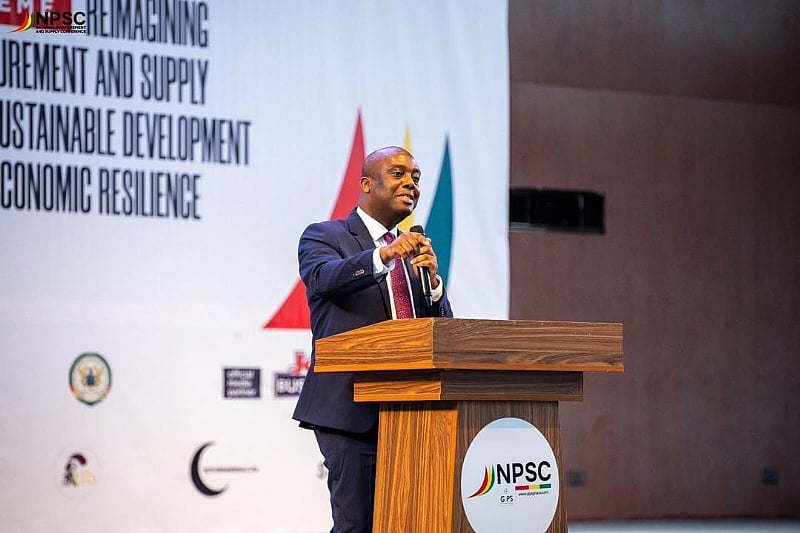The Ghanaian government is embarking on a comprehensive overhaul of its public procurement system to address the substantial financial losses incurred annually due to irregularities. Deputy Finance Minister, Thomas Nyarko Ampem, highlighted the severity of the issue, citing a report by the Ghana Institute of Procurement and Supply (GIPS) that estimated annual losses of GH¢2.36 billion due to procurement breaches. This significant sum, he argued, represents a drain on public resources that could otherwise be invested in essential services such as healthcare, education, and climate-resilient infrastructure. The Deputy Minister emphasized the detrimental impact of these inefficiencies, stating that they hinder development, erode public trust, and deprive the nation of opportunities for job creation and improved access to vital services. He framed the issue as a moral imperative, questioning why resources are being wasted on inefficiencies and infractions while vulnerable populations remain underserved.
The Deputy Minister identified several prevalent irregularities within the public procurement system, including unauthorized procurements, inconsistent evaluations of bids, inadequate supervision, and the use of vague specifications tailored to favor specific suppliers. These practices, he warned, undermine the integrity of the procurement process and contribute to the significant financial losses. To combat these issues, the government has implemented several key reforms. Amendments to the Public Procurement Act now mandate commencement certificates and budgetary allocations as prerequisites for all central government-funded procurements, adding a layer of oversight and financial control. Furthermore, the Ministry of Finance has established a dedicated PFM Compliance Division to ensure adherence to regulations through the Ghana Electronic Procurement System (GHANEPS), leveraging technology to enhance transparency and accountability.
The government’s commitment to reforming the procurement system extends beyond these initial measures. Mr. Nyarko Ampem revealed that the Procurement Practising Bill is currently under consideration by the Cabinet. This legislation aims to professionalize the procurement field, establish stricter standards of conduct, and implement robust safeguards against malpractice and corruption. By formalizing the profession and introducing stronger ethical guidelines, the bill seeks to elevate the importance of procurement and ensure that it is conducted with integrity and professionalism. The anticipated outcome is a more robust and transparent procurement process that promotes efficiency and value for money.
The reforms are firmly rooted in President John Mahama’s economic reset agenda and align with the broader 24-Hour Economy Programme. This program emphasizes local production, green procurement practices, and job creation as key drivers of economic growth and sustainable development. By prioritizing local content, the government aims to stimulate domestic industries and create employment opportunities. The focus on green procurement reflects a commitment to environmental sustainability, integrating environmental considerations into purchasing decisions. The overarching goal is to create a more resilient and inclusive economy that benefits all Ghanaians.
Mr. Nyarko Ampem called upon procurement professionals to embrace technology, diligently enforce existing laws, and prioritize value for money in all procurement decisions. He stressed the importance of leveraging technology to streamline processes, enhance transparency, and improve efficiency. He urged professionals to uphold the highest ethical standards and enforce regulations rigorously to prevent corruption and ensure fair competition. By focusing on value for money, procurement professionals can maximize the impact of public spending and contribute to sustainable development. He emphasized the broader economic benefits of prioritizing local content, arguing that it fosters the growth of industries capable of competing both regionally and internationally.
The National Procurement and Supply Conference, themed “Transforming Public Procurement for Sustainable Development: Policies, Practices and Pathways,” provided a platform for stakeholders to discuss these critical issues and collaborate on solutions. The Deputy Minister’s address underscored the government’s commitment to reforming the public procurement system and creating a more transparent, efficient, and accountable process. The reforms are expected to not only reduce financial losses but also enhance public trust, promote local industry, and contribute to sustainable development. The emphasis on technology, ethical conduct, and value for money signifies a paradigm shift in the approach to public procurement, aiming to create a system that serves the best interests of the nation and its citizens.


